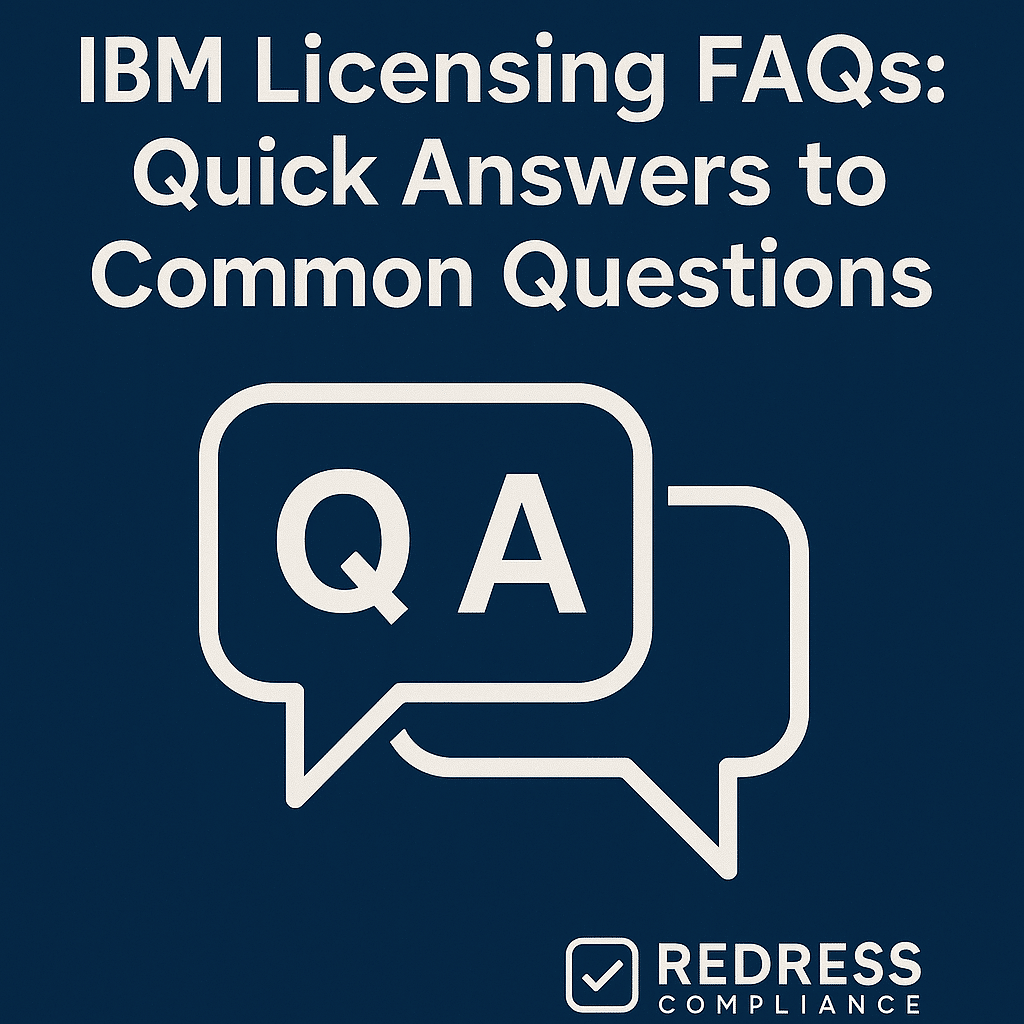IBM Licensing FAQs

In the fast-paced world of enterprise software asset management, IBM’s licensing rules can be notoriously complex.
CIOs, procurement leaders, SAM managers, and other stakeholders often require prompt, concise answers to pressing IBM licensing questions without having to wade through dense documentation.
This FAQ-style blog post distills 20 of the most common IBM licensing questions into concise, strategic answers. Read our IBM Licensing Overview.
Each answer focuses on what decision-makers need to know – from key licensing metrics and compliance requirements to negotiation insights and best practices – providing a rapid reference to navigate IBM licensing with confidence and clarity.
For busy IT executives, these quick answers cut through jargon to highlight exactly what you need to know to manage IBM licenses effectively and avoid costly missteps.
Q: What is IBM Passport Advantage?
A: IBM Passport Advantage is IBM’s primary software licensing and support program, centralizing enterprise software procurement under one agreement with volume discounts.
Q: What is a PVU license?
A: IBM’s per-core licensing metric (Processor Value Unit) aligns software cost to server CPU capacity; greater hardware capacity requires proportionally more PVU licenses.
Q: What is an RVU license?
A: IBM’s resource-based licensing metric (Resource Value Unit) ties entitlements to a defined resource usage (like data volume or devices) specific to each product.
Q: Do I need ILMT for IBM PVU licenses?
A: Yes, IBM mandates ILMT for PVU sub-capacity licensing compliance; without ILMT, you must license the entire server capacity.
Q: What is sub-capacity licensing?
A: Sub-capacity licensing lets you pay for only the virtualized portion of a server instead of full hardware capacity, saving costs if ILMT is deployed.
Q: What is IBM’s standard support uplift?
A: IBM’s standard support uplift is the typical annual maintenance fee increase (~5-7% yearly) that procurement should anticipate and try to negotiate down.
Q: What is a true-down right?
A: A true-down right lets you reduce license quantities (and costs) if usage declines, usually allowed at renewal time in enterprise agreements.
Q: Can IBM licenses transfer after M&A?
A: Yes, IBM licenses can transfer post-M&A, but only with IBM’s formal approval; without it, licenses remain non-transferable, and you may need to repurchase.
Q: What triggers an IBM audit?
A: Common IBM audit triggers include rapid usage growth, missing ILMT in virtualized environments, M&A activities, lapsed support, or other compliance red flags. Also read IBM Licensing in Mergers & Acquisitions: Risks, Compliance, and Negotiation Strategies.
Q: How often does IBM audit customers?
A: IBM contractually can audit annually, but in practice, audits typically occur around every 2-3 years for large customers. Regular compliance checks help minimize surprises.
Q: What’s IBM Tailored Fit Pricing (TFP)?
A: IBM Tailored Fit Pricing is a custom pricing model (often for mainframes) offering predictable flat pricing over a term instead of usage-based charges.
Q: What’s the biggest compliance risk in IBM licensing?
A: Failing to deploy ILMT for PVU sub-capacity is the biggest compliance risk; without ILMT, IBM demands full-capacity licensing, creating major cost exposure.
Q: Are IBM SaaS renewals negotiable?
A: Yes, IBM SaaS renewals are negotiable; treat them like new deals. Leverage usage data and vendor alternatives to push for better pricing and terms.
Q: How much discount can I expect from IBM?
A: IBM discounts vary widely by product and deal size. Enterprise software often sees discounts of 20-30% off the list price, with higher discounts (50%+) available for strategic deals.
Q: Can I move IBM licenses to AWS or Azure?
A: Yes, IBM generally allows using existing licenses on AWS/Azure (BYOL); just ensure compliance (e.g., ILMT for sub-capacity) and follow IBM’s cloud policy.
Q: What’s a typical IBM renewal timeline?
A: IBM renewals usually start 3-6 months before contract end. Expect early quotes; the best practice is to initiate negotiations around 90-120 days before expiration.
Q: Can I bundle IBM software for bigger discounts?
A: Yes, larger bundled deals yield deeper discounts. IBM offers better pricing for multi-product or enterprise agreements, but ensure you’re not paying for unused software.
Q: What is IBM Global Financing?
A: IBM Global Financing is IBM’s finance arm, providing leases, loans, and payment plans for IBM solutions, enabling customers to spread out costs for software/hardware investments.
Q: Does IBM allow partial support drops?
A: Yes, IBM allows dropping support on some licenses at renewal; however, those licenses become unsupported (no upgrade rights,) and reinstating later is costly.
Q: What’s the #1 best practice for IBM licensing?
A: Proactive license management is the top practice: maintain an accurate inventory of entitlements and regularly audit usage (with ILMT) to ensure compliance and avoid overspending. Read our IBM Licensing Terminology: A Beginner’s Glossary for IT and Procurement Teams.
Read about our IBM Licensing Assessment Service.
